The cinematic art of Cristian Mungiu
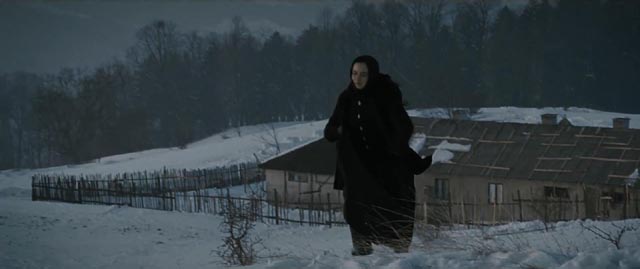
Romania under Nicolae Ceausescu was one of the poorest and most mismanaged states in the Soviet Bloc until the collapse of Communism in 1989 led to rioting and the violent overthrow of the dictator. Economic hardship and corruption remained even after this revolution. Not surprisingly, as the country struggled to remake itself, a generation of filmmakers felt compelled to address the complex and seemingly all-encompassing social and political malaise. It was in 2005 that the Romanian New Wave was born (with Cristi Puiu’s The Death of Mr. Lazarescu), giving rise to an intense examination of the experience of ordinary people living under duress. It was like the rebirth of neo-realism, but devoid of any trace of sentimentality.
In these films, people often have to navigate society’s institutions – hospitals and the police figure prominently – within which the rules are fluid and uncertain. Moral clarity becomes quickly clouded, personal decency is compromised by outside forces; individual autonomy ultimately has little power in the face of a deeply ingrained corruption.
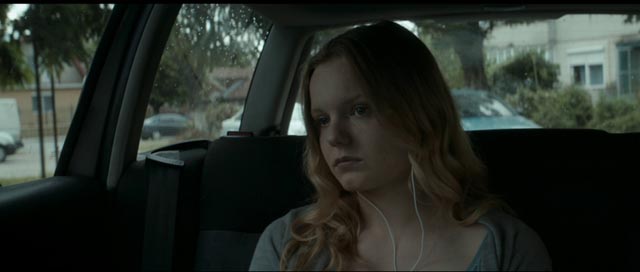
Cristian Mungiu was a key figure in the emergence of the New Wave, his second feature, 4 Months, 3 Weeks and 2 Days (2007), becoming one of the defining films of the movement. Set in the waning years of the Ceausescu regime, it followed the grueling journey of two young women as they seek an illegal abortion, this seemingly simple narrative becoming an exploration of the power and limits of personal friendship in the face of a repressive police state. In particular, it dealt with the constraints and dangers faced by women in a misogynist society.
Mungiu has not been prolific – apart from contributions to two omnibus films, he has made only four features in fifteen years – but he has established himself as one of the finest filmmakers of his generation, not just in Romania but globally … a point confirmed by the numerous awards and nominations each of his films has received. The proof is fully apparent in a pair of recent Criterion Blu-ray releases of Mungiu’s third and fourth features.
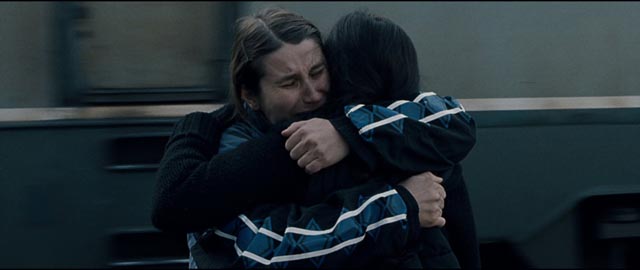
Beyond the Hills (2012)
In Beyond the Hills, Mungiu again focuses on the friendship of two young women. Based on an actual incident which occurred in 2005, the film is set in a small remote religious community in northern Romania. Although it takes place in the post-Communist era, this setting gives the story a kind of timelessness; under the leadership of a strict Orthodox priest, a group of nuns live in primitive conditions, without electricity, drawing water from a well even in the bitter depths of winter. Among them is a young novice named Voichita (Cosmina Stratan) who grew up in an orphanage and now clings to the highly controlled life of the monastery. As the film begins, Voichita is at the local railway station to meet her childhood friend Alina (Cristina Flutur), who has been away working in Germany. Alina has come to take Voichita back with her, having arranged jobs for them both on a cruise ship.
Although, as is typical of Mungiu’s work, we are never given much background detail, there are hints and suggestions about the girls’ past in the orphanage – violence and abuse which Alina protected Voichita from; a possible sexual relationship between the two girls who clung to each other for comfort. Voichita gets permission from the priest, Papa (Valeriu Andriutã), for Alina to stay for a while, but tensions quickly develop. Alina has been desperately lonely in Germany and longs for the comfort and support of Voichita, but Voichita has transferred her dependence to the religious community; she feels loyalty to Alina, but doesn’t want to leave with her.
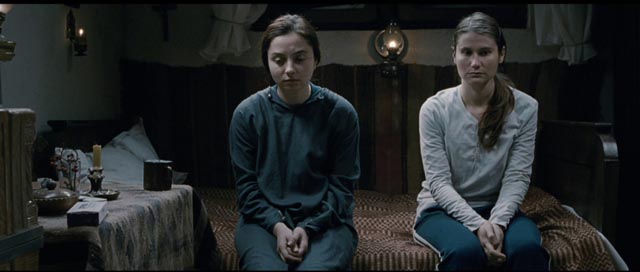
As this reluctance becomes more apparent, Alina begins acting out, disrupting the community’s rituals with obvious contempt. The more resistance she meets, the more extreme her behaviour becomes; when her building rage triggers a kind of seizure, the nuns bind her with ropes and a gag and take her to a hospital in the nearby town. This hospital is a nightmare, underfunded and overcrowded, with patients two to a bed. There is little time and less inclination among the medical staff to do anything for Alina. Drugs are prescribed and the doctor tells the priest it would be best to take her back to the monastery and pray for her.
Not surprisingly, Alina’s condition deteriorates; the priest insists she must leave and Voichita with her; Voichita pleads for help … and, at the pleading of the nuns, the priest finally agrees to perform an exorcism. Alina is locked up, subjected to an enforced fast, and eventually chained to rough boards in the form of a cross as the priest reads prayers over her. Although Alina is finally calm, this comes just before she dies. The authorities arrest the priest, holding him responsible for Alina’s death … although it is clear that her fate was set by a long succession of failures among the various institutions which at one point or another had some responsibility for her well-being.
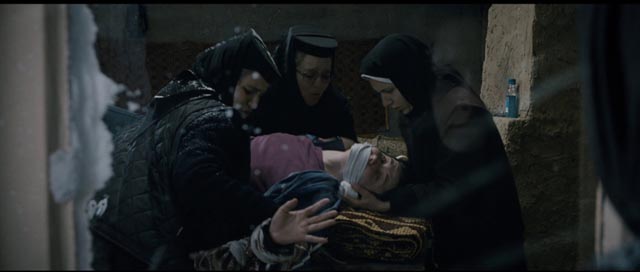
In Mungiu’s hands what could have been an attack on the primitive superstitions of the religious community becomes far more complex and nuanced. He withholds his own judgment, allowing the audience to form their own opinions. While the treatment Alina receives at the hands of the priest and nuns seems brutal and primitive, they are motivated by their own desperate desire to save her from a condition they barely understand; but their responsibility has been imposed by the refusal of the medical authorities to deal with her. And even before all this, she was failed by the orphanage and the foster family to which she had eventually been released (a brief visit to retrieve her things from this family is itself complicated; while they seem well-intentioned, they nonetheless exploited her and have taken most of her savings for their own use); she perceived the only possibility for her own salvation to be a life with Voichita, but her friend for her own survival has transferred her loyalty to the priest and her fellow nuns.
*
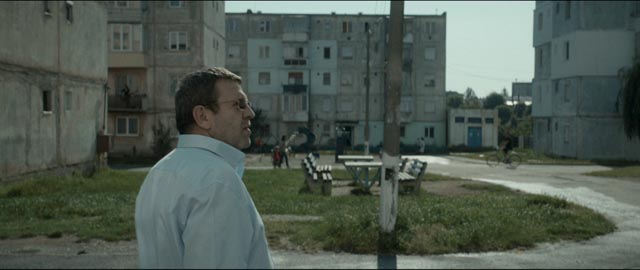
Graduation (2016)
It was four years before Mungiu released his next film, this time with a narrative firmly set in contemporary Romania. In Graduation (2016), a respected surgeon who sees himself as a decent, moral man, is gradually undone by circumstances. His daughter Eliza (Maria Dragus) is about to take her final exams; a scholarship to study in England that she has been provisionally awarded depends on her maintaining a high mark … but the day before the exams begin, she is violently assaulted on her way to school. Shaken, her right wrist injured and requiring a cast, her ability to perform is in doubt. Her father, Romeo (Adrian Titieni), has devoted his life to giving Eliza a chance to escape from Romania and his concern now is more for the risk of failure than the trauma she has suffered. When it proves impossible to gain a postponement for her exams, he puts pressure on Eliza to overcome her trauma and focus on the exams.
But beyond this is Romeo’s personal sense of guilt, because, in a hurry to get to his mistress’ home, he had dropped her off that morning short of the school. In a sense, he was at least partially responsible for the attack on Eliza. His relationship with Sandra (Mãlina Manovici), a teacher at Eliza’s school, is somewhat transactional, a way for him to escape the stifling relationship he has with his chronically ill wife Magda (Lia Bugnar). So even before the complications arising from the attack on Eliza and its impact on her exams lead Romeo down a rabbit hole of compromise and corruption, he is already a morally flawed man; he has seen himself as above the corruption which permeates the world around him, yet step by step he quickly, inevitably falls.
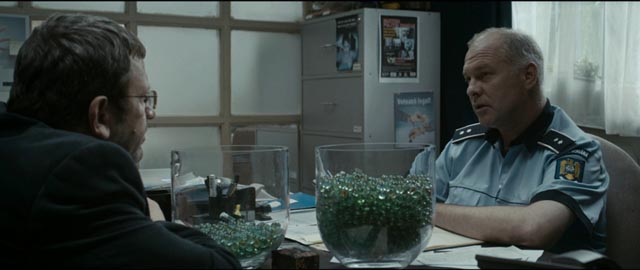
Eliza’s first exam doesn’t go well and the scholarship is in jeopardy; Romeo’s old friend, now the local chief of police (Vlad Ivanov), puts him touch with an official they both know who owes him a favour; Vice-Mayor Bulai (Petre Ciubotaru) is willing to have a word with the head of the examination committee, and all Romeo needs to do is arrange for him to be moved up the list of those waiting for a liver transplant. Romeo is embarrassed to be getting involved in this chain of personal favours, all of which circumvent various rules designed to maintain some kind of social order.
Worst of all, in order to fix the exam, Romeo must involve Eliza herself; she has to mark her paper in a certain way so that the examiners will recognize it and make adjustments in the marking. Eliza is appalled because this violates everything her parents have taught her about honesty and decency; a rift opens up, quickly growing larger when it becomes apparent that Eliza knows about her father’s affair. In disgust, she begins talking about scrapping the whole idea of going abroad to study – perhaps she will stay here, get a job, settle down with her boyfriend. She is on the brink of rejecting everything Romeo has committed himself to on her behalf.
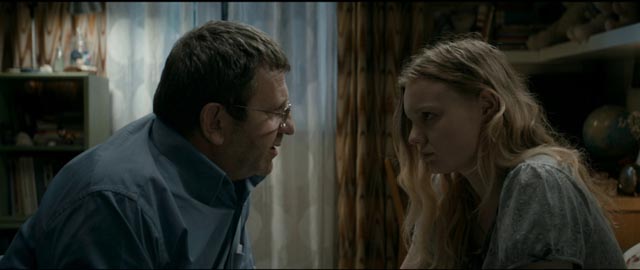
The chain of connections being forged among the expanding group of officials since that first favour involving the exam begins to unravel; it becomes clear that the authorities have been tracking a corruption case involving Vice-Mayor Bulai and Romeo is now in their sights. When Magda learns that Eliza knows about his affair with Sandra, something she herself has been tolerating (and which may be a major cause of her own sickness), she kicks Romeo out. His life is rapidly collapsing and he can only find some kind of personal equilibrium by finally letting go – by accepting that Eliza must make her own choices, and by owning up to the prosecutors his own part in Bulai’s corrupt dealings. By admitting to himself his own moral failings, he begins to emerge from the trap he has walked into.
We never learn what Eliza’s ultimate decision is, but the film ends with Romeo attending her graduation and there is a sense of peace between them.
*
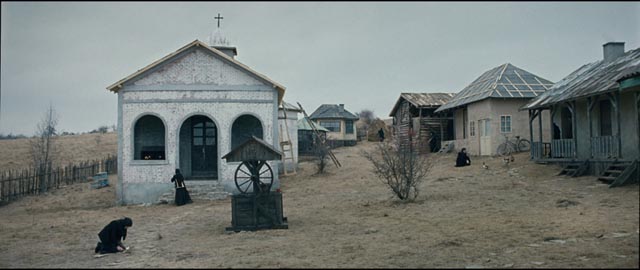
As in 4 Months, 3 Weeks and 2 Days, Mungiu’s style in both of these films is one of quiet observation. He favours long takes in which the camera interacts with the characters as part of a careful visual choreography; frequently scenes play in a single shot through which we get only partial information about what is happening. This demands our focused attention and requires interpretation and judgments which may shift from moment to moment; it’s a remarkable balancing act, the careful construction of complex dramatic elements which play as spontaneous interactions among the characters observed with detachment. Mungiu’s films have no musical scores to direct the viewer’s attention and emotions – although we frequently hear music coming from the radio in Romeo’s car, a selection of classical pieces which help to create an almost hermetically sealed cocoon in which he is protected from the decaying urban environment through which he drives.
The style of both films is an elegant naturalism, greatly aided by superb casts who completely inhabit their characters; the widescreen compositions have a formal clarity, even as the handheld camera continuously moves through scenes in response to the characters’ movements. This creates a constant sense of a larger world beyond the frame; which in turn evokes a larger dramatic space of which we are seeing only fragments. Although Mungiu avoids overt backstories, we can feel the characters’ lives stretching into the past and sense their continuation beyond the moments in which the films’ narratives end. Both films left me with a desire to continue in these worlds, to know what was going to happen next to these people – as in life, Mungiu’s films lack final closure, even as they end at satisfying dramatic moments. His artistry seems effortless and deceptively simple, yet these films are complex, with depths which can’t be exhausted in a single viewing.
*
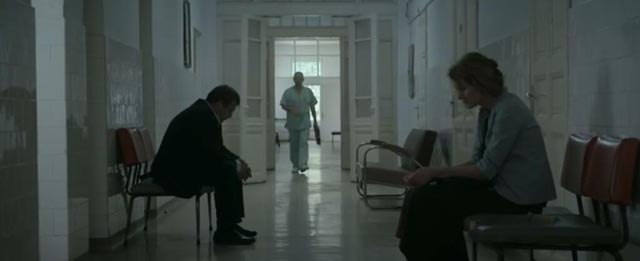
The disks
Criterion’s Blu-rays present both films in pristine 2.39:1 widescreen transfers. Beyond the Hills was shot on 35mm (the bitterly cold winter shoot precluded using digital cameras), while Graduation was a fully digital production. Both films’ soundtracks provide clear dialogue and a subtle use of natural ambiances.
The Supplements
Each film features an interview with Mungiu (Beyond the Hills, 35:46; Graduation, 29:33) in which he is extremely articulate (in English) about his intentions and his working methods; he isn’t interested in talking about what the films mean, but he is clear about the means by which he searches for the meaning of the stories he chooses to tell and the technical means by which he tells those stories.
His approach is illustrated well by a featurette on the making of Beyond the Hills (36:24) which addresses the events the film was based on, finding the locations, building the monastery from scratch, casting, and shooting in a bitterly cold winter. We get to see Mungiu rehearsing complicated scenes and finding ways to integrate the camera into the action, both revealing and concealing elements of the drama in order to create a sense of a lived-in world.
Each disk has a selection of deleted/alternate scenes (Beyond the Hills with twelve scenes, 19:38; Graduation with seven, 8:23); some of these are simply brief moments, some quite lengthy. They offer an interesting glimpse of how Mungiu finds more precise ways to convey dramatic information, eliminating extraneous detail, using suggestion rather than overt statement while losing nothing of clarity.
Each disk also includes a Cannes press conference with Mungiu and his casts (Beyond the Hills, 54:48; Graduation, 41:47). I only sampled these as the questions tend to be repetitive and Mungiu’s answers, while very articulate, frequently avoid direct responses because too many of the reporters present want him to explain the films’ meanings.
Each film’s trailer is included (2:02 and 2:17 respectively), and the booklet essays are by film scholar Doru Pop (Beyond the Hills) and Bilge Ebiri (Graduation).
Both disks are excellent and together they provide a revelation of the richness of contemporary Romanian cinema.
Comments